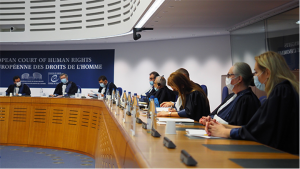By: Rebecca Buchanan
Impunity Watch Staff Writer
STRASBOURG, France – On October 21, 2020, the Grand Chamber of the European Court of Human Rights (“ECHR”) held a hearing on the case of Denis and Irvine v. Belgium, regarding the release of applicants held in compulsory confinement in Belgium for crimes no longer eligible for detainment under the Compulsory Confinement Act of May 5, 2014. The applicants alleged that their continued confinement constitutes a violation of Articles 5(1) and 5(4) of the European Convention on Human Rights: the right to liberty and security of person and the right to a quick decision on the lawfulness of detention.

The complaint represents an aggregation of separate claims from applicants Jimmy Denis, a Belgian national, and Derek Irvine, a British national, brought to the court on August 21, 2017. Both applicants were placed in compulsory confinement under the Social Protection Act of April 9, 1930—Denis for theft 2007, and Irvine for attempted aggravated burglary in 2001.
The Social Protection Act allows that “trial courts may order the detention of an accused who has committed a serious crime and is suffering from one of the conditions set out in section 1,” including severe mental disturbance, defects, or disorders that make an individual incapable of controlling their actions. The applicants were both evaluated and confined pursuant to these qualifications, a point which they do not argue before the court.
The Compulsory Confinement Act of May 5, 2014, which entered into force in October 2016, restricted the court’s ability to order compulsory confinement only to individuals “who ha[ve] committed a crime or serious offense that has harmed or could have harmed the physical or mental integrity of another person,” and for “whom there is a danger that he or she will commit fresh offenses…on account of his or her mental disorder.” According to the Justice Committee of the House of Representatives, the act was intended to clarify the requisite conditions for compulsory confinement to ensure that minor offenses could no longer result in continuing detainment and to isolate properly those cases for which extended confinement is just.
In accordance with the new legislation, the applicants argue that their compulsory confinement is without legal basis, as the reasons for their incarceration do not meet the updated requirements. They applied to the Belgian courts for immediate trial and release but were denied. Upon their denial, the applicants lodged their complaint with the ECHR.
In the Chamber judgment issued by the ECHR on October 8, 2019, the Court determined that the continued compulsory confinement of the applicants did not qualify as a violation of Article 5(1) or 5(4), as it had not been “arbitrary or manifestly unreasonable” under Belgian law, and “continued to be based on judicial decisions taken under the former social protection legislation.”
Following the unanimous decision of the Chamber Court, the applicants successfully requested that their case be referred to the Grand Chamber. The hearing will aid in determining the retroactive applicability of the Compulsory Confinement Act and the legislative impacts of its amended scope.
For further information, please see:
European Court of Human Rights – Denis and Irvine v. Belgium, Chamber Judgement – 8 Oct. 2019
European Court of Human Rights – Forthcoming Hearings in October 2020 – 1 Oct. 2020